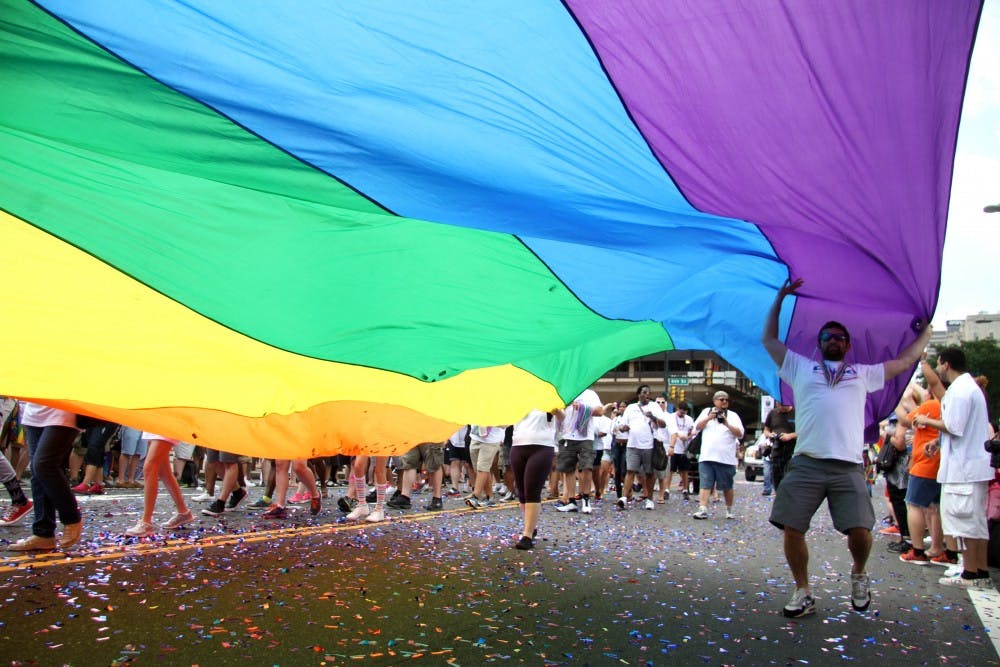It was a historic day on June 26 in Washington, as supporters of same-sex marriage gathered on the steps of the Supreme Court to celebrate the legalization of same-sex marriage in all 50 states. As the nation reacted to the momentous decision, members of the Penn community shared their thoughts on the long-controversial issue and its new future.
Penn student David, who is the co-chair of Penn IvyQ and involved in Penn Queer and Asian and the Carriage Senior Society, was “ecstatic” when he heard the news. David wanted to be identified only by his first name because he is not yet out to his mother, who he said reads The Daily Pennsylvanian.
“It means a great deal to me to have my desires represented on a federal level, especially when only a few select countries actually support gay marriage,” he said. “I think ultimately this decision will reduce discrimination. I feel like younger children will now grow up with the notion that gay marriage is legal and sanctioned by our government, and thus will view homosexuality through a less stigmatized lens.”
LGBT Center Director Bob Schoenberg said that the decision was “very exciting.”
“Most people I know are thrilled about it,” he said, though he noted that some LGBT supporters are concerned that marriage equality has taken precedent over other issues, such as workplace equality and transgender rights.
“Marriage is in the forefront and has made it to the top court in the land,” he said. “I think the battles [over other LGBT issues] will continue and we will be victorious in those battles as well.”
Political science professor Rogers M. Smith, who teaches constitutional law classes at Penn, said in a statement that the Supreme Court’s decision has implications beyond same-sex marriage.
“Important as it is, the Supreme Court’s ruling in favor of same-sex marriage probably only accelerates slightly what the tides of history and changing popular views would soon have brought about in any case,” Smith said. “But the statements in Justice Anthony Kennedy’s majority opinion stressing how a fundamental commitment to human dignity undergirds constitutional guarantees of equal protection and privacy are likely to shape debates over the Constitution’s meaning on many issues and for many decades to come.”
The United States is now the 21st country to legalize same-sex marriage nationwide.
The Justices were divided in a 5-4 ruling. Justice Anthony Kennedy wrote the majority opinion. He stated that “[Gay Americans] ask for equal dignity in the eyes of the law. The Constitution grants them that right.”
Each of the dissenting justices wrote their own opinions. Chief Justice John Roberts wrote that the decision had “nothing to do with the Constitution,” and Justice Antonin Scalia wrote that the ruling was a “threat to American democracy.”
President Obama, who vocalized his support for same-sex marriage in 2012, praised the decision, calling it “a victory for America.”
Prior to the ruling, 36 states, including Pennsylvania, permitted gay couples to marry. The remaining 14 states — Alabama, Arkansas, Georgia, Kentucky, Louisiana, Michigan, Mississippi, Missouri, Nebraska, North Dakota, Ohio, South Dakota, Tennessee and Texas — must now end the same-sex marriage ban.
Two political groups on campus, Penn College Republicans and Penn Democrats, both expressed their support of the decision.
“The College Republicans welcome the decision. As an organization which has historically supported gay marriage, we are gratified that Anthony Kennedy, a Reagan appointee, along with a majority of the court ruled in favor of marriage equality,” President of the College Republicans and College junior Will Cassidy said in a statement.
RCollege senior and President of Penn Democrats Sean Foley agreed.
“Penn Democrats applauds the Supreme Court for recognizing the right of Americans to marry whom they love,” Foley said in a statement. “Many opponents of same-sex marriage argue that the matter of same-sex marriage should have been left to the states, that the Supreme Court had no business making this decision. But although our states might be laboratories of democracy, the United States of America should never experiment with human rights. The ability to love freely is surely such a right.”
Despite the satisfaction of many Penn students, gay and straight alike, some expressed displeasure.
One rising sophomore, who asked to remain anonymous in fear of backlash from peers, was strongly opposed.
“I think that marriage is between one man and one woman, and that’s a personal opinion, but unfortunately, my personal opinions don’t factor into U.S. law,” he said. “Having two parents of the same gender, that’s out of balance with society.”
Though against the marriage of same sex couples, he added that he does not object to gays themselves.
“I have no problem with [gay people],” he said. “They are human beings like you and me. I have some friends who are gay … I just don’t get into the subject of gay marriage with them.”
Aside from the hurdle of those who continue to oppose same-sex marriages, David said that, despite the ruling, the fight for gay rights is far from over.
“There are many other issues affecting queer individuals daily, like trans violence, racism and mental health issues, that legalizing gay marriage will not solve,” he said. “And I think a lot of people are worried that now that gay marriage is legalized, people will question queer activists by asking them ‘What more do you want? You already have equality! Everything is fixed! Stop complaining.’”
David added that his decision to remain anonymous in this story also represents how much more needs to be done.
“I think part of me being anonymous adds to the fact that legalizing gay marriage isn’t the end of the fight,” he said. “Personally, while I’m still very happy about the legalization of it, I still have a hard time imagining the day I can actually get married. Because that would mean coming out to my mom, which no amount of legalization could help me do.”
News editor Caroline Simon contributed reporting to this article.



